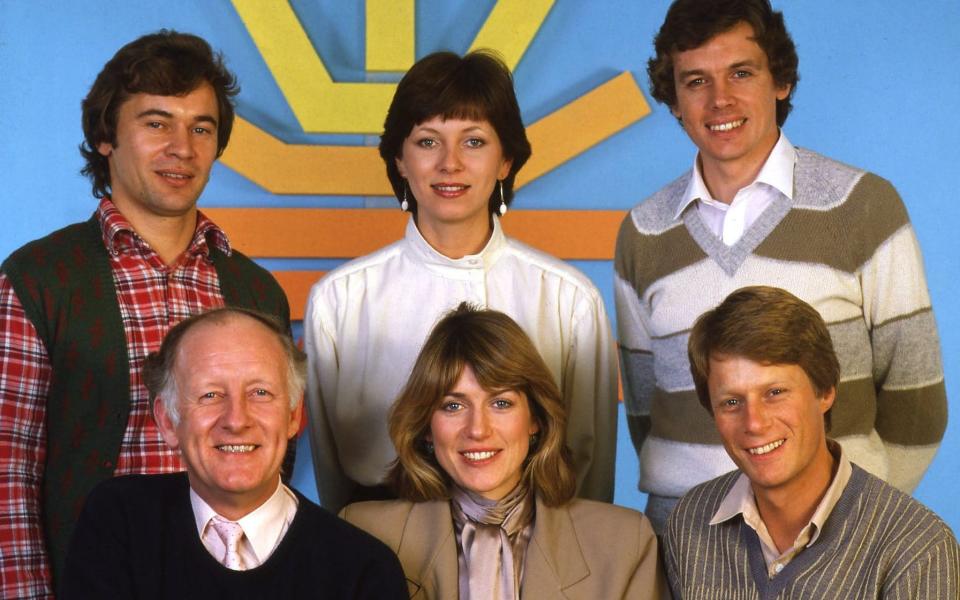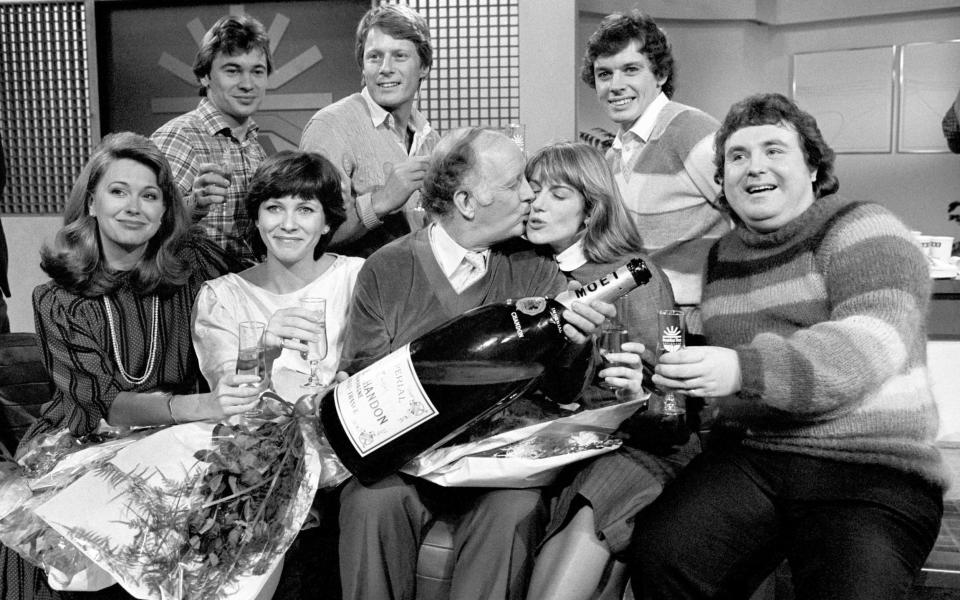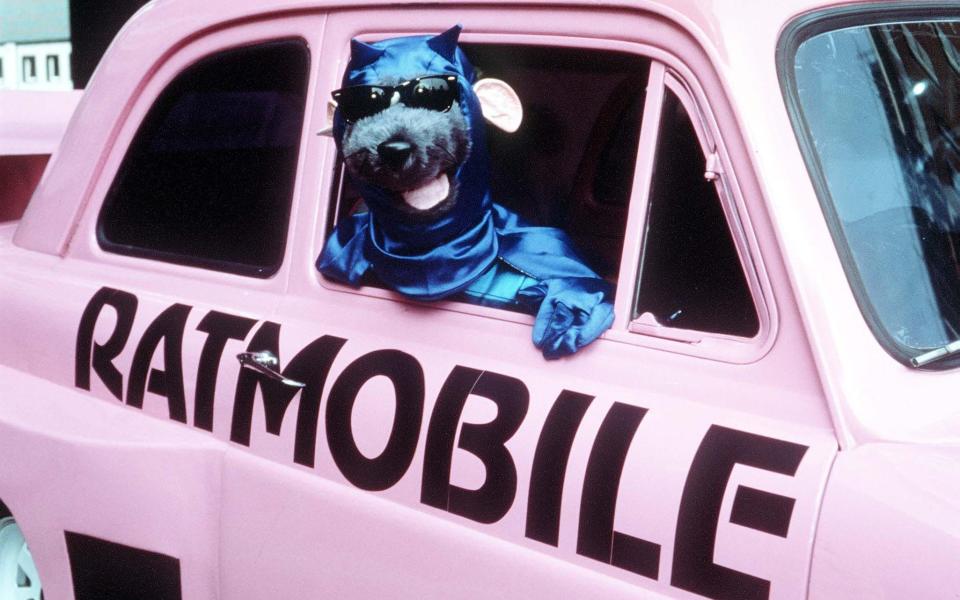The battle to rule Britain’s breakfast TV: ‘You never knew who was going to be sacked’

As Nick Ross drove along Hawley Crescent in Camden in the dead of night, his heart sank. He was heading in to start his new presenting job at the BBC, but couldn’t help feeling it might all be a waste of time.
He had just driven past TV-am’s new studios, which were, with much fanfare, soon to broadcast its new breakfast programmes Daybreak and Good Morning Britain. Once a car showroom, now the roof facing Regent’s Canal was decorated with several large concrete eggs in egg cups. Soon the £10 million digs would be home to ITV’s ‘Famous Five’ presenters: Michael Parkinson, David Frost, Angela Rippon, Anna Ford and Robert Kee. Jeff Wayne had even been drafted in to write the theme tune.
Ross had signed up to front the BBC’s own early morning show, Breakfast Time, which had been put together in response to TV-am. On January 17 1983 it would become the first breakfast show in British TV, but Ross and his colleagues Frank Bough and Selina Scott expected to be crushed by the TV-am juggernaut as soon as it launched on February 1. They had all the money and all the star power. Their heavyweight line-up had been given, in the words of chief exec Peter Jay, a “mission to explain”. Ross pulled onto the Westway near Paddington, found himself in an unexpected 2.30am traffic jam, and sighed.
There was, at least, little pressure on Breakfast Time. On the day of the first show, leaked BBC reports suggested up to 70 per cent of viewers had no intention of watching. Indeed, television broadcasting at that time of the day was viewed with some suspicion. “It was bad enough that people were being led astray and staring at the gogglebox at night, but the idea that you'd have television during the day was somehow absolutely disgraceful,” Ross says. “In 1982, there was a genuine and serious undercurrent that it was not quite proper.”
The BBC’s managing director Aubrey Singer urged sceptics to give the novelty a chance. “You do not know if you are for it unless you have actually seen it,” he told The Times in April 1982. “And while you might be against the idea, once we start I think a lot of people will learn to welcome it.”

Ross remembers Ron Neil, the man tasked with producing Breakfast Time, as a “very easygoing, avuncular figure”. In February 1983, television started after midday with educational programming and current affairs, but Neil’s programme would be far more relaxed.
“He wanted this to be bright, cheerful, sunny, and that people should wake up and we should be part of their family,” Ross says. That meant an eclectic mixture of features; an interview with a Cabinet minister might be followed by recipes or TV previews with Leo Sayer.
“I must say I bridled at the idea that we were going to have all these keep fit classes and cookery,” says Ross, “but the one thing I put my foot down on was astrology.”
Ross initially refused to introduce the astrology segments, worried it would undermine his hard journalism credentials. But despite the harrumphing, he and astrologer Russell Grant became friends and Grant was a hit: “In the end, even the bit that I disliked the most became an integral part of the show.”

Diana Moran took a longer way round. She had broken into TV as a model for adverts on Television West and Wales for local businesses: the South West Electricity Board and a campaign for a skirt shop stick in the memory, and the odd promo for exclusives in the Sunday tabloids. “Say there had been some secret woman in some MP's life, I would be dressed as the secret woman,” she remembers now. “You didn't see my face.”
She balanced running fitness sessions at Butlins on Barry Island and training a squadron of other Butlins instructors with shooting in Bristol, until she was spotted as the face of Harlech Television (HTV) and drafted into a fitness spot on a programme called Here Today. She’d been wearing a red leotard in her classes, but was told it wouldn’t work on TV.
“I started off in yellow and they said I looked like a large prancing canary,” she says. “I then went into a frightfully elegant coffee colour and they said, ‘God, you look as if you are absolutely nude on the screen’.” She landed instead on green, and in early January recorded her first fitness class on the concourse of a freezing Waterloo station.
At 6.30am, Bough welcomed viewers to the brave new world of breakfast television. Ross remembers the gallery being “jittery” ahead of the first show. But aside from a wayward methuselah of champagne wielded by Chief Toastmaster Ivor Spencer – it was wheeled out to wet the show’s head only to fizz up and spurt everywhere, covering Scott in suds – everything went better than hoped. “There was this sense, ‘Well, you know, TV-am is still gonna kill us, but my God, we've done a creditable show,’” Ross says.

But despite its star power, TV-am didn’t connect with viewers. It felt stiff and dour next to the brightly coloured, pullover-wearing Breakfast Time crew. Ratings started below expectations and went south from there, touching 300,000 at one particularly low point.
Presenter Nick Owen recalled later to the BBC that TV-am was “in absolute turmoil,” and uncertainty reigned. One of the TV-am weathermen got home from a holiday and, while checking his answerphone messages, found out that he’d been let go in absentia.
“There was definitely an atmosphere of almost fear that the place was going to close at any time,” Owen said. “There were mass meetings loads of times. You never knew who was going to be sacked the next day.”
Early on in his time as a main presenter, Owen tried to avoid the intense media scrutiny by leaving the Camden studios lying in the back of a van under a blanket. The same intensity made Moran a star, and the press sniffed around her old workplace for stories.
“And HTV, because I'd known them for so many years, they said, ‘Oh, that's Diana. She's so tall and lovely. She's our green goddess’.”
The Green Goddess name stuck. Moran’s friends still call her ‘GG’, as do her grandchildren – though to them it stands for ‘Granny Goddess’. Her viewers, she thinks, were largely people who had thought exercise wasn’t for them. “Then they realised that actually I was a 43-year-old with two lads in their 20s and everything changed, and people's attitude was, ‘oh, blimey – if she could do that at 43, perhaps we should be trying to do something like that’.”
Her segments offered a way to get moving which avoided the gym. “In those days, a woman would never go to a gym,” says Moran. “There weren't gyms for women – there just weren't. Gyms were purely and simply stinky places [filled] with really old sweaty sweaters and boots and things; [they were] for rugby players, footballers and boxers.”
#OnThisDay 1983: “The Green Goddess”, Diana Moran, was exercising with women from 16 to 69 on Breakfast Time. pic.twitter.com/kHtmXnQh51
— BBC Archive (@BBCArchive) February 7, 2020
She picked up some famous fans on the way. In 1983 she appeared at the Royal Variety Performance – in a green dress, naturally – and was presented to the late Queen Elizabeth II. “You must come and take my staff through some keep-fit some time,” Her Majesty told Moran.
By March 1983 things were getting particularly fraught at TV-am. But the franchise’s fortunes really started to turn on 1 April, when Roland Rat made his first appearance.
He was an immediate hit. In May, Good Morning Britain was overhauled: in came cooking, fishing tips and a workout section. The BBC affected indifference – “This may be the first time in history that a rat has come to the aid of a sinking ship,” a spokesman sniffed in August 1983 – but Roland Rat helped drag ratings up during the summer holidays.
The rodent puppet wasn’t just a handy bit of levity either. Toymakers Hasbro reportedly kept TV-am afloat with an up-front payment for three months of advertising of their Roland Rat toys. TV-am’s finances were wobbly throughout its first couple of years, to the point that the Electricity Board repeatedly turned up at those flashy offices to disconnect the power.
“I remember being rung up on more than one occasion and told not to park my office car in the company garage, because we were going to close down that day, so I might as well hang onto the car and use that as a lever to get paid,” TV-am news chief Peter McHugh told Ian Jones in Morning Glory: A History of British Breakfast Television. “And that went on for months.”

Nonetheless, by the end of 1983, TV-am had overtaken Breakfast Time’s viewing figures. The shows kept fighting it out until Breakfast Time was cancelled in 1989. TV-am shuttered in 1992.
When Ross had lunch with Frost a couple of weeks before he died in 2013, they reflected on their tussle. “He was very candid about this,” says Ross, “that it wasn't just that the BBC had done a brilliant job, it was that they [TV-am] had, looking back on it, taken a rather condescending approach.”
For Moran it was a “whirlwind”; for Ross, the lingering feeling is one of intimacy. “We were in people's houses and in their bedrooms, when they may have had no clothes on, when they were getting dressed, vaguely looking at it from the bath or the shower or at the breakfast table. You were sort of part of their home, part of their family.”

 Yahoo Movies
Yahoo Movies 
